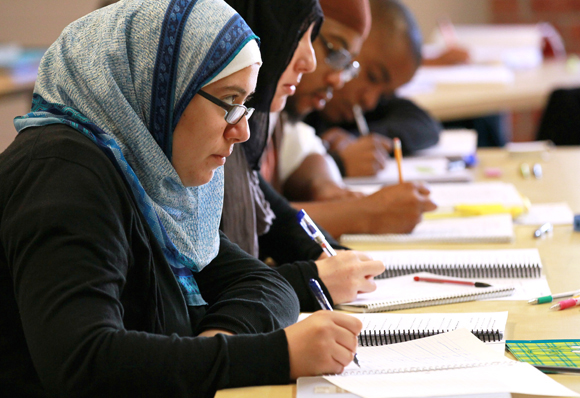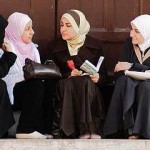How Are Men’s Bad Characteristics Women’s Good Characteristics?
In Imam Ali’s (P) words, the best elements of a Muslim woman’s personality which are considered at the same time the worst for men, are as follows:
خيار خصال النساء شرار خصال الرجال، الزهو و الجبن و البخل، فاذا كانت المرأة مزهوةً لم تمكن من نفسها و اذا كانت بخيله حفظت مالها و مال بعلها و اذا كانت جبانة فرقت من كل شيئ يعرض لها.
(زهو) (Zahv means inviolability that is a woman must be inviolable in her social activities and her sense of pride should be dominant over her predisposition.)
If a woman were inviolable, she would never allow a stranger to have authority over herself and if woman were niggardly, she would take care of the economy of the family and if a woman were timid she would never be involved with things that would be a threat to her chastity. However, in the field of education and training it is said that a person should be extrovert, have social communications and seek for a brethren in religion and must never fear.
If these three elements of the personality of a woman, which have been mentioned according to Imam Ali’s (P) perspective, seem unusual, more explanation and interpretation are required. These elements, which endanger woman and put her in a predicament are of two states, the general and particular here, the particular state is mentioned. Such destructive characteristics in both woman and man are not desirable in the general state, since Islam endeavors to educate human beings who are free from arrogance, fear and pride.
So, Imam Ali (P) does not consider the elements of pride and inviolability in its general state however, inviolability has a different meaning from pride. Inviolability means that Islam has defined a structure for a woman’s personality. According to educational and training standards, a woman must be extrovert and be able to relate with others easily and if she could not relate with the opposite sex, she may have reservations with the opposite sex, while according to Islam, a woman must observe a boundary in her social responsibilities.
Regarding the characteristic of niggardly, its general state is considered as well. When the Holy Qur’an states:
…وَمَنْ يُوقَ شُحَّ نَفْسِهِ فَأُولَٰئِكَ هُمُ الْمُفْلِحُونَ
“Those who are shielded from their own avarice will be prosperous.” (59:9)
His Holiness Ali (P) discarding such an incorrect concept through the analysis and interpretation of his words, states:
فاذا كانت المرأة مزهوة لم تمكن من نفسها
“If a woman continually observe a boundary and certain precautions in her own social relations, she will never be exploited and vulnerable.
لم تمكن نفساً ً
“She never allows herself to be misused.”
فاذا كانت بخيله
“If she has the characteristic of stinginess……”
حفظت مالها و مال بعلها
“.. she will safeguard her own property, that of her marital life and also that of her husband.”
فاذا كانت جبانة فرقت شيئ يعرض لها
“If a woman be concerned, in social interactions she will have fright and together with precaution and apprehension driving away many calamities and contention as well.”
Nevertheless, Imam Ali (P) considers the best characteristics of women as the worst attributes of man pointing out that from the Islamic point of view the role and position of woman is completely different from that of man in marital life. The nature and personality of woman had been created in a manner that is compatible with such characteristics and virtues.
The martyr, Motahari states: “The reason why the characteristics mentioned in this narration are not considered in general, in its absolute state and include particular instances, is that regarding stinginess, if its general state is mentioned, it will be incompatible with the certainties of the Holy Qur’an. The verse:
…وَمَنْ يُوقَ شُحَّ نَفْسِهِ فَأُولَٰئِكَ هُمُ الْمُفْلِحُونَ
“Those who are shielded from their own avarice will be prosperous.” (59:9)
Considers the element of prosperity as the point opposite to stinginess. It is expected of a woman to be proud towards strangers and not towards the husband, other women and/or her relatives close to her. What is focused upon is the pride in order to safeguard chastity and perform social responsibilities.
According to the above-mentioned verse, obsession of this world is condemned and one who can rescue oneself from this obsession and free oneself from worship of worldly matters or wealth will reach the stage of prosperity. So, it is not the best characteristic for a woman not to spend out of her property. Her Eminence Zahra, (P) as an example did not have stinginess in its general state. Stinginess is for the purpose of:
المرأة راعية علي بيت اهلها
“The woman is the supervisor and the one responsible inside the house, in the family and in relation with her husband.”
As I have mentioned, Islam considers some characteristics favorable to woman, which are undesirable for man. Definitely, the general state of these characteristics because of its incompatibility with the certainties of the Holy Qur’an is not desired. The preference and encouragement of the characteristics of pride fear and stinginess is because of the vulnerability of woman. Stinginess and niggardliness is for the conjugal property according to Imam Ali (P) who states:
اذا كانت بخيلة حفظت مالها و مال بعلها
“Of course, both woman and man are responsible to safeguard conjugal property.”
The woman has an essence called chastity, which is vulnerable in social interactions therefore, she must possess a characteristic required to guard this vulnerability. Throughout history nowhere has it been mentioned that a woman violated a man, on the contrary, there have been so many cases regarding violations against woman.
Therefore, fear is for safeguarding the chastity of a woman and encouraging to have this characteristic is observing precaution. Accordingly, perseverance and sensitivity in defending chastity as the basis of personality and complement of woman’s dignity has been recommended to her.
The Martyr Motahhari states: “A woman’s fear in the position of enjoining the good and forbidding the wrong is condemned. The verse:
المومنون و المومنات بعضهم اولياء بعض يامرون بالمعرو ف و ينهون عن المنكر
“Some men believers and women believers are superior over the other believers they command decency and forbid dishonor.”
Considers woman and man as partners and equal in enjoining the good and forbidding the wrong. To safeguard values it is said that one has to offer one’s wealth or life unless it may cost your chastity. So fear has meaning only in this point. Where it is stated “enjoin the good”, it says:
المومنون و المومنات. . .
“Men and women believers.”
or says:
الرجال قوامون علي النساء بما فضل الله بعضهم علي بعض
“Men are the ones who should support women since God has given some persons advantages over others.”
It does not say:
بما فضل الله الرجال علي النساء
“Since God has given men advantages over women.”
In fact here it means mutual rights not superiority. The interpretation of guardianship is presented and guardianship is not specified to men, rather woman is the one who safeguards values and fundamentals as well. However, God considers the characteristics of both woman and man and accordingly the duty of superiority.
In the words of the Chief of the Faithful, fear in its absolute sense is not considered, for instance, the action of Her Eminence Zahra to reclaim Fadak, is an example and the action not being for material gain indicates the courage of that lady.
His Holiness Ali (P) observing one, who has such an indifference towards the world, comes to the field in like manner, bears difficulties and never fears, never stated that the actions of Her Eminence Zahra (P) were incompatible with the fundamentals of Islam. For instance, at the time of usurpation of the caliphate, she, along with a group of women of Quraish entered the mosque to prove the legitimacy of the guardianship leadership of the Chief of the Faithful (P) and safeguard the principles as well. This shows why fear is reasonable on some occasions and is not desirable in any conditions. It can only be practical for safeguarding and protecting the woman.
Written by Abbas Ali Shameli



